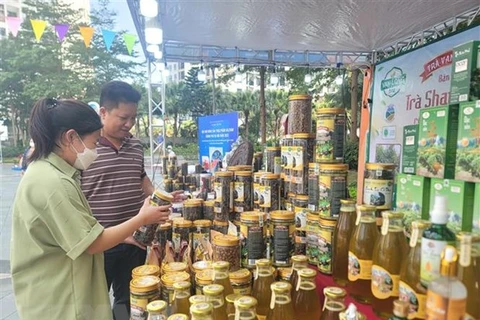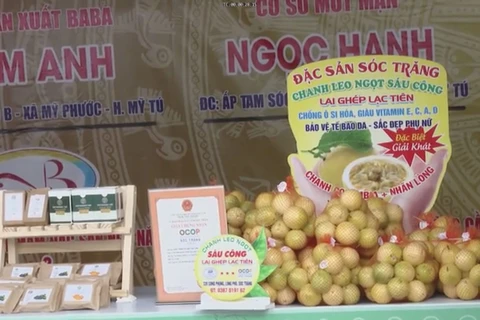 Vietnam boasts over 10,000 OCOP products with three-star status or higher (Photo: Duc Duy/VietnamPlus)
Vietnam boasts over 10,000 OCOP products with three-star status or higher (Photo: Duc Duy/VietnamPlus) Hanoi (VNA) - The One Commune, One Product (OCOP) programme has contributed to changing the practices of rural communities, paving the way for new manufacturing models and trade of traditional goods that are of local advantages, heard a conference held in Hanoi on December 5.
The OCOP programme, approved in Prime Minister’s Decision No. 490/QD-TTg on May 7, 2018, encompasses three primary goals: developing forms of organised production and business, changing the economic structure to improve incomes, and advancing agriculture and production in rural areas.
After more than five years of implementation, Vietnam now has 10,322 OCOP products in all 63 provinces and cities.
Among these products, more than 67% have achieved three-star status, while over 30% have been awarded four stars, and nearly 1% have the potential to achieve a five-star recognition.
In addition, over 5,360 businesses are joining OCOP programme, of which over 38% are cooperatives, more than 24% are enterprises, and nearly 35% being production or business households.
Bui Nguyen Anh Tuan, Deputy Director of the Domestic Market Department under the Ministry of Industry and Trade, highlighted that OCOP products have been integrated into the nationwide distribution networks such as Go! MM Mega Market, Saigon Co. op, Winmart, and Winmart+.
 Bui Nguyen Anh Tuan, Deputy Director of the Domestic Market Department under the Ministry of Industry and Trade speaks at the conference (Photo: VNA)
Bui Nguyen Anh Tuan, Deputy Director of the Domestic Market Department under the Ministry of Industry and Trade speaks at the conference (Photo: VNA) Furthermore, prominent retail groups like Central Retail, AEON, and Saigon Co. op have partnered with the Ministry of Industry and Trade in hosting events that facilitate the connection, promotion, and sale of OCOP products.
These initiatives include OCOP Weeks at Big C, OCOP product fairs at AEON department stores and supermarkets, and OCOP agricultural product promotion weeks within Saigon Co. op’s system.
OCOP products are also made available at stops along highways, airports and tourist destinations.
By integrating the promotion of OCOP products with the tourism sector, various localities have successfully stimulated production and purchase activities, establishing robust supply chains and ensuring product consumption.
Additionally, OCOP products have popped up on popular online shopping platforms such as Lazada, Shopee, Tiki, Clam So, Postmart, and even TikTok.
Nguyen The Anh, Director of the Distribution Business Centre at the Vietnam Post, said the corporation has collaborated with Chinese partners to support the sale of OCOP and agricultural products in the market.
To embark on the international market, OCOP product manufacturers must prioritise packaging, product design, and timely supply to meet the growing demand of customers, he said.
To further enhance OCOP product consumption, Deputy Director of the Department of E-commerce and Digital Economy of the Ministry of Industry and Trade, said the department is actively promoting support programmes.
These initiatives involve collaborating with e-commerce platforms and technology partners to assist businesses and cooperatives by providing marketing solutions, logistics support, and facilitating trade on digital platforms. These efforts aim to minimize the time and distance required to access technology.
She also advised OCOP product manufacturers to focus on improving marketing strategies, product packaging, and visual representation to complement market demands.
Additionally, leveraging the support of partners and e-commerce platforms can facilitate market access and optimise product consumption, she added./.























